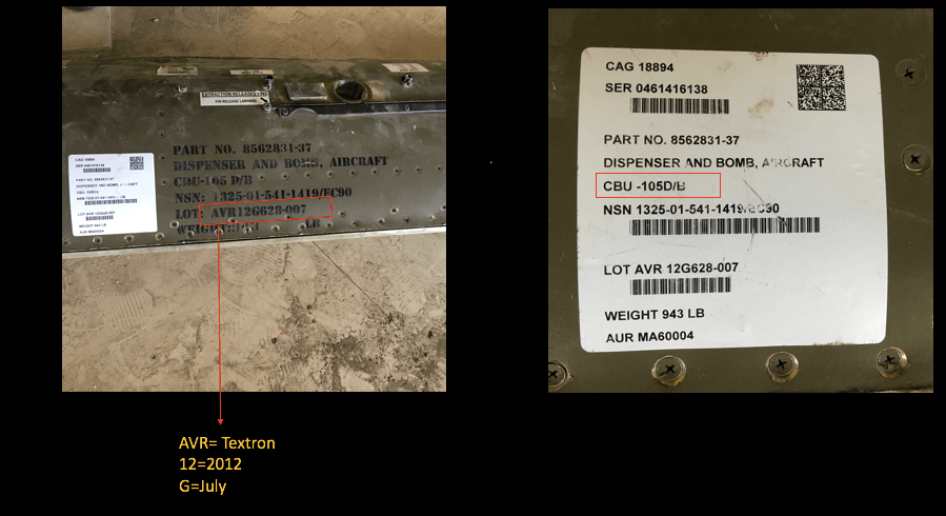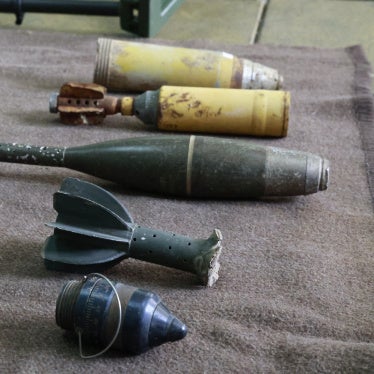The United States should make its suspension of cluster munition transfers to Saudi Arabia permanent and extend it to all other countries, Human Rights Watch said today.
Human Rights Watch has independently confirmed a report in Foreign Policy on May 27, 2016, that the White House has directed US officials to halt transfers of cluster munitions to Saudi Arabia immediately. The decision follows reports by Human Rights Watch, Amnesty International, the United Nations, and others, of harm to civilians from the weapons in Yemen, where Saudi Arabia has led a military operation against Houthi forces, also known as Ansar Allah, since March 26, 2015.
“The decision not to transfer any more cluster munitions to Saudi Arabia is a step in the right direction, but the US should halt all cluster munition transfers to any country and make that suspension permanent,” said Steve Goose, arms director at Human Rights Watch and chair of the Cluster Munition Coalition. “This would help bring the US into line with core obligations of the international treaty banning cluster munitions.”
In a June 1 interview with MSNBC’s Chris Hayes, Secretary of State John Kerry expressed concern at the high number of civilian casualties in the Yemen conflict. Kerry did not address cluster munitions, but did not deny the host’s statement that the administration has decided to stop deliveries of these weapons.
Cluster munitions, which contain multiple smaller submunitions or bomblets, are dropped from aircraft or delivered from the ground by artillery and rockets. They pose an immediate threat to civilians as they disperse over a wide area and also leave explosive remnants, including submunitions that fail to explode upon impact and become de facto landmines.
Cluster munitions are prohibited by a 2008 treaty signed by 119 countries, though not by the US, Yemen, or Saudi Arabia, and its coalition partners Bahrain, Egypt, Jordan, Kuwait, Morocco, Qatar, and Sudan. At a diplomatic meeting in Geneva on May 19, Yemen’s representative stated that the government is considering accession to the Convention on Cluster Munitions following use of the weapons in his country.
In the past year, Human Rights Watch has documented civilian casualties in Yemen from the Saudi-led coalition’s use of four types of air-dropped and ground-launched US-made cluster munitions. This includes the use of CBU-105 Sensor Fuzed Weapons in at least six airstrikes in the governorates of Amran, Hodaida, Saada, and Sanaa.
The CBU-105 is prohibited under the international ban treaty. US export law provisions dating to December 2007, permit the transfer of cluster munitions with a failure rate of less than 1 percent as long as they are not used in civilian areas. The CBU-105 is the only type of cluster munition exported by the US since 2008. According to the US Department of Defense, the recipient must agree that “the cluster munitions and cluster munitions technology will be used only against clearly defined military targets and will not be used where civilians are known to be present or in areas normally inhabited by civilians.”
Research by Human Rights Watch has demonstrated that Saudi Arabia has used CBU-105 Sensor Fuzed Weapons in or near civilian areas of Yemen. The research also found multiple examples of the weapons not functioning in ways that meet the 1 percent reliability standard.
The most recently recorded CBU-105 attack documented by Human Rights Watch in Yemen was on February 15, near a cement factory in Amran governorate. Markings on the remnant of the CBU-105 bomb casing and its inventory control sticker collected from the site of the attack and photographed by Human Rights Watch show that the weapon was manufactured in July 2012, by Textron Systems Corporation of Wilmington, Massachusetts.
The US concluded a contract with Textron Defense Systems in 2013, for the manufacture of 1,300 CBU-105 Sensor Fuzed Weapons for delivery to Saudi Arabia by December 31, 2015. However, as Foreign Policy also noted, US officials have repeatedly refused to clarify whether all the cluster munitions have been delivered, and Textron has said it does not comment on delivery dates.
Saudi Arabia has repeatedly denied using other types of cluster munitions in Yemen, but it has admitted using CBU-105 Sensor Fuzed Weapons once, in April 2015, “against armored vehicles.” None of the CBU-105 attacks documented by Human Rights Watch in Yemen have involved armored vehicles nor have any damaged or destroyed armored vehicles been documented at the strike locations.
The UAE has acknowledged stockpiling CBU-105 Sensor Fuzed Weapons, but denies using them in Yemen.
The use of cluster munitions in Yemen since April 2015 has received worldwide media coverage, provoked a public outcry, and has been condemned by dozens of countries as well as by a European Parliament resolution. In September 2015, more than 60 nations at the First Review Conference of the Convention on Cluster Munitions expressed deep concern at the use of cluster munitions in Yemen and issued a declaration condemning “any use of cluster munitions by any actor.”
Human Rights Watch chairs the Cluster Munition Coalition U.S., which has called on President Barack Obama to review the June 2008 policy directive by then-Secretary of Defense Robert Gates and remove the exception allowing for cluster munitions that result in a less than 1 percent unexploded ordnance rate.
“Saudi Arabia should heed US concerns about civilian harm from its cluster munition attacks in Yemen and immediately stop using these weapons,” Goose said. “Saudi Arabia and its coalition partners should destroy rather than use any remaining stocks of cluster munitions and provide assistance to clear cluster munition remnants on the ground in Yemen.”








